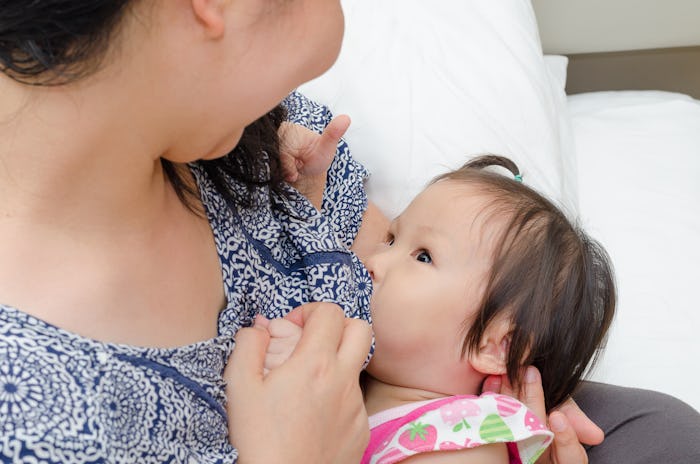There are so many benefits to paid parental leave, especially for new moms. Just this week, a new study found that the length of a woman's maternity leave can even affect how she breastfeeds. There have been previous studies on the health impacts of maternity leave, but this one in particular examined women in the military and their infants.
Back in 2014, active duty women were only allowed six weeks of maternity leave and in 2016 it was extended to 12. The study, which was presented at the Pediatric Academic Societies (PAS) 2018 Meeting, found that women started breastfeeding at the same time, despite their maternity leave. But those who were allowed 12 weeks ended up breastfeeding for longer and reported better experiences overall, which is really useful data when it comes to crafting parental leave policies.
According to the Centers for Disease Control and Prevention, breastfeeding has health benefits for both the baby and the mother. In infants, exclusive breastfeeding has been linked to a reduced risk of allergies, diabetes, and obesity, among other things. For moms, breastfeeding can also reduce the risk of chronic health conditions. The American Academy of Pediatrics (AAP) recommends that a mom exclusively breastfeeds for the first six months of a baby's life, and then introduce "complementary foods" along with breastfeeding for as long as she and her newborn want.
Basically, if a woman can and wants to breastfeed, there are a ton of great reasons to do it. But it's not easy, which is why women who struggle with breastfeeding end up quitting when they don't have enough support, the CDC reported. But having paid time off from work can change that.
This is not entirely new information to medical experts. Andrew Delle Donne, one of the authors of the study, said in a Eureka Alert statement:
This study was conducted to evaluate and validate existing knowledge about breastfeeding success in a military population. Similar to civilian studies, we found that longer duration of maternity leave increases breastfeeding success throughout the first year of life in a military population. The conclusions are important to justify increased maternity leave in the military population and provide additional support to conclusions made in civilian studies.
The study found that there was a large increase of breastfeeding at the two-month mark, which is also when many women report giving it up entirely. That makes sense if you think about it — having to return to work, pump, and keep a feeding schedule is not easy. In fact, the AAP found in another study of civilian moms in California that paid parental leave especially helps women who hold non-managerial positions, "lack job flexibility," or have high levels of stress. It concluded:
Pediatricians should encourage patients to take maternity leave and advocate for extending paid postpartum leave and flexibility in working conditions for breastfeeding women.
Although the Family and Medical Leave Act ensures that some workers get twelve weeks of paid leave from their job and benefits, not everyone has that luxury, whether it's because they haven't worked at a place long enough or work at a small company that isn't legally required to offer it. Even women who do have jobs that allow for parental leave tend to return to work as soon as they can, usually because they're stressed about money or their job security, according to Breastmilk Counts.
New moms are placed in a tricky position by our society. Everyone around them, from their primary care doctor to next door neighbor, encourages breastfeeding for as long as possible and even shames them in some cases when they give it all up and switch to a bottle. But no one exactly makes breastfeeding simple, whether it's making public breastfeeding difficult, forcing a woman to pump in some closet in the office, or not providing support from the start.
This study, along with others, suggests that giving new moms some financial security and freedom from some arbitrary time constraints at work can help them do what most medical experts suggest is best for both babies and moms. Hopefully legislators and employers get the message.
Check out Romper's new video series, Bearing The Motherload, where disagreeing parents from different sides of an issue sit down with a mediator and talk about how to support (and not judge) each other’s parenting perspectives. New episodes air Mondays on Facebook.
